|
|
|
Sort Order |
|
|
|
Items / Page
|
|
|
|
|
|
|
| Srl | Item |
| 1 |
ID:
123064
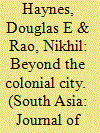

|
|
|
|
|
| Publication |
2013.
|
| Summary/Abstract |
It was long customary to begin essays on the historiography of cities in South Asia by mentioning the low level of scholarly interest once given to the study of urban pasts; 2 but a major corpus of work on this subject certainly now exists. In our view, the most important shortcomings of the existing body of scholarship now lie less in their neglect of historical urbanism than in the relative inattention given to a particular phase of urban history: the middle decades of the twentieth century. The historiography of South Asian cities has concentrated highly on what might be called 'the long nineteenth century', 3 a phase lasting from the establishment of British rule (which varied according to the region being discussed) to some point during the early twentieth century. Many of the richest works in the field confine themselves completely to nineteenth-century developments 4 or begin sometime during the late nineteenth century, edge into the initial decades of the twentieth century, and then end at some point in the 1920s or 1930s.
|
|
|
|
|
|
|
|
|
|
|
|
|
|
|
|
| 2 |
ID:
132312
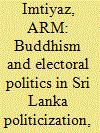

|
|
|
|
|
| Publication |
2014.
|
| Summary/Abstract |
Organized religions often play a significant role in the political affairs of any country when political actors carefully employ them to pursue power. Buddhism is the major religion on the island of Sri Lanka, and often it becomes a powerful symbol for Sinhala-Buddhist politicians. This study examines the interaction between Buddhism and politics in Sri Lanka, and will attempt to examine the religious factors in Sri Lanka's ethnic conflict between the two nations; namely, Tamil and Sinhala. It will examine how the politicization of Buddhism helped Sinhala political elites and leaders in their quest for power, reinforcing religious and ethnic tensions, and finally will discuss some solutions to de-religionize the state structure to help Sri Lanka enjoy the fruits of modernization and democracy.
|
|
|
|
|
|
|
|
|
|
|
|
|
|
|
|
| 3 |
ID:
175818
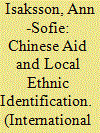

|
|
|
|
|
| Summary/Abstract |
Recent empirical evidence suggests that Chinese development finance may be particularly prone to elite capture and patronage spending. If aid ends up in the pockets of political elites and their ethno-regional networks, this may exacerbate ethnic grievances and contribute to ethnic mobilization. In this research note I examine whether Chinese development projects make local ethnic identities more salient in African partner countries. A new geo-referenced data set on the subnational allocation of Chinese development finance projects to Africa is geographically matched with survey data for 50,520 respondents from eleven African countries. The identification strategy compares sites where a Chinese project was under implementation at the time of the interview to sites where a Chinese project will appear subsequently. The empirical results suggest that living near an ongoing Chinese project makes ethnic identities more salient. There is no indication of an equivalent pattern when considering other donors’ development projects.
|
|
|
|
|
|
|
|
|
|
|
|
|
|
|
|
| 4 |
ID:
131791
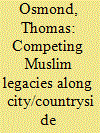

|
|
|
|
|
| Publication |
2014.
|
| Summary/Abstract |
Between the Middle East and Eastern Africa, the city of Harar is often considered as the main historical centre of Islam in Ethiopia and the Horn of Africa. Until recently, the cultural hegemony of the Muslim elites inhabiting Harar was commonly opposed to the almost pagan behaviours of the Oromo - or 'Galla' - farmers and cattle herders living in the wide rural vicinity of the town. The 1995 Constitution provided the different 'ethnolinguistic nationalities' of the new Ethiopian federation with the same institutional recognition. However, the institutionalisation of the two Harari and Oromo 'nationalities' seems to foster the historical duality between the city-dwellers and their close neighbours. This article proposes another political history of Harar and its ambivalent Oromo partners through the local dynamics of the Muslim city/countryside models. It reveals the both competing and complementary orders that have probably bound together the populations of Harar and its rural hinterland for more than five hundred years.
|
|
|
|
|
|
|
|
|
|
|
|
|
|
|
|
| 5 |
ID:
137568
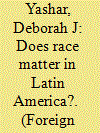

|
|
|
|
|
| Summary/Abstract |
In 1992, the Nobel Committee awarded its Peace Prize to Rigoberta Menchú Tum, the daughter of poor Guatemalan peasants, for her work promoting indigenous rights. Her prize, momentous in its own right, highlighted a sea change in Latin American politics. Throughout the 1980s and early 1990s, prominent indigenous movements had emerged in countries such as Bolivia, Ecuador, Guatemala, and Mexico. As a result, Latin American countries undertook unprecedented reforms to address ethnic diversity: politicians amended national constitutions to recognize indigenous people, passed laws supporting bicultural education and affirmative action, and added questions about race and ethnicity to official censuses.
|
|
|
|
|
|
|
|
|
|
|
|
|
|
|
|
| 6 |
ID:
007256
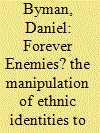

|
|
|
|
|
| Publication |
2000.
|
| Description |
149-190
|
|
|
|
|
|
|
|
|
|
|
|
|
|
|
|
| 7 |
ID:
133104
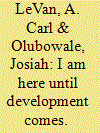

|
|
|
|
|
| Publication |
2014.
|
| Summary/Abstract |
Government demolitions have displaced hundreds of thousands of people in Abuja, Nigeria's Federal Capital Territory, over the last decade. This housing insecurity is not simply the result of urbanization, population growth, or wealth disparities. We attribute it instead to a property rights regime that perpetuates discrimination by providing special land rights for the area's early inhabitants. Laws accenting differences between "strangers" and indigenes, and migrants' social coping mechanisms that reinforce ethnic identities, should exacerbate the conditions for conflict. However, as indigenes have been short-changed by policies to relocate and compensate them, their interests have aligned more closely with migrants seeking improved housing security. Strategies to achieve this have shifted from judicial appeals and confrontational protests to government engagement. By pursuing the shared goal of housing rights for migrants and indigenes alike, new multi-ethnic coalitions have helped defuse tensions over land that have proved to be conducive to conflict elsewhere in Nigeria.
|
|
|
|
|
|
|
|
|
|
|
|
|
|
|
|
| 8 |
ID:
129470
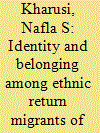

|
|
|
|
|
| Publication |
2013.
|
| Summary/Abstract |
This article explores the nature, construction, and negotiation of identity among Oman's ethnic return migrants called Zinjibaris. Using a social psychological approach, in which ethnic identity is conceptualized as fluid and socially constructed, the study examines how these migrants first define their identity in Zanzibar and then redefine it and forge a sense of belonging on returning to their ancestral homeland. The life stories of four women, representing three generations of returnees, highlight the role played by sociohistorical narratives and Arab descent ideology in constructing a multihyphenated identity-Zinjibari-Omani and Arab-Omani. They also reveal the implications of such an identity positioning for processes of inclusion and differentiation.
|
|
|
|
|
|
|
|
|
|
|
|
|
|
|
|
| 9 |
ID:
131991
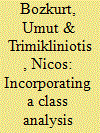

|
|
|
|
|
| Publication |
2014.
|
| Summary/Abstract |
This article has two main aims. First, it aims to challenge the widespread narrative in Cyprus studies that presents ethnic identities as historically inevitable and natural. Rather, identities need to be conceptualized as socially constructed. The second aim of this article is to problematize the argument that ethnic or national groups are homogenous actors. It underlines the need to deconstruct these supposedly unitary actors by making use of a class-based conceptualization of the state. By using such a conceptualization, the article will focus on the period between 1878 and 1974. It will start with a concrete analysis of the class structure in the Cypriot society and then will trace how different classes in both communities positioned themselves vis-à-vis political structures of power and how these positionings paved the way to the division of the island.
|
|
|
|
|
|
|
|
|
|
|
|
|
|
|
|
| 10 |
ID:
178957
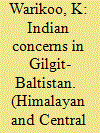

|
|
|
| 11 |
ID:
132309
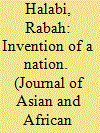

|
|
|
|
|
| Publication |
2014.
|
| Summary/Abstract |
Ethnic and national identities are shaped and evolve in the context of complex negotiations sustained among multiple players, each with its own and often contradicting interests. This study focuses on one unique cultural group, the Druze in Israel, and examines a multifaceted identity constructed as a direct result of policies and expectations of members and institutions of majority groups. My aim is to explore how this identity is defined within the complex intergroup context, the various components and their inter-relations (congruent or conflictual), and the way its boundaries are shaped through interaction with other identities in Israel. The analysis of the interviews conducted with 50 Druze university students in Israel yielded three major content categories: 'Druze by blood;' 'Arab, but less so;' and 'Being Israeli.' The Druze identity is constructed in primordialist terms, and a central role is assigned to the belief in reincarnation. The Arab identity is categorized primarily as a national one, and it is strongly affected by the negative attitude of Arabs toward the service of the Druze in the Israeli army. Three major aspects emerged in relation to the Israeli identity of the Druze: the fact of their being citizens of the State of Israel, the attitude of the state and of Jews toward them, and the army service. Our study portrays a highly complex and problematic constellation of group identities, shaped as a delicate adaptation to the unique position of a group subject to multiple political forces in the past and present.
|
|
|
|
|
|
|
|
|
|
|
|
|
|
|
|
| 12 |
ID:
133023
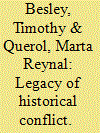

|
|
|
|
|
| Publication |
2014.
|
| Summary/Abstract |
This article exploits variation between and within countries to examine the legacy of recorded conflicts in Africa in the precolonial period between 1400 and 1700. There are three main findings. First, we show that historical conflict is correlated with a greater prevalence of postcolonial conflict. Second, historical conflict is correlated with lower levels of trust, a stronger sense of ethnic identity, and a weaker sense of national identity across countries. Third, historical conflict is negatively correlated with subsequent patterns of development looking at the pattern across grid cells within countries.
|
|
|
|
|
|
|
|
|
|
|
|
|
|
|
|
| 13 |
ID:
123764
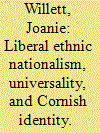

|
|
|
|
|
| Publication |
2013.
|
| Summary/Abstract |
Within the liberal paradigm, ethnic nationalism and identity are often conceptualized as 'exclusive', lacking the capacity for universal membership (Ipperciel 2007; Kohn 1946; Kymlicka 1995), and is juxtaposed against 'inclusive', civic forms of identity. This article problematizes this claim, asking whether civic territorial identities also contain their own forms of exclusion. Using the New Regionalism and the identity politics of contemporary economic development, this article explores civic/ethnic identities in Cornwall in the context of Agnew's (2005) observations about contemporary liberal values. The article finds that, in Cornwall, civic forms of territorial identity that distance themselves from ethnic Cornishness are more exclusive than contemporary ethnic nationalism in the region, introducing economic rather than ethnic exclusions. This raises questions about why ethnic identity can be negatively characterized in regional development discourses and what the effects of this might be.
|
|
|
|
|
|
|
|
|
|
|
|
|
|
|
|
| 14 |
ID:
119560
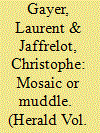

|
|
|
| 15 |
ID:
023595
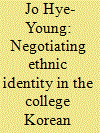

|
|
|
|
|
| Publication |
Jan-March 2002.
|
| Description |
87-116
|
|
|
|
|
|
|
|
|
|
|
|
|
|
|
|
| 16 |
ID:
132200
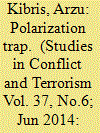

|
|
|
|
|
| Publication |
2014.
|
| Summary/Abstract |
This article studies the association between ethnic conflicts and political attitudes. It employs a new data set on the casualties of the ethnic conflict in Turkey to identify the effects of the Kurdish insurgency on the electoral behavior of the Turkish voters. The results indicate that the conflict leads to the political polarization of the society along ethnic nationalist lines. Further investigation of the data also provides some empirical support for the constructivist argument that the salience of ethnic identities is subject to change in response to external stimuli, of which ethnic conflict constitutes a drastic example.
|
|
|
|
|
|
|
|
|
|
|
|
|
|
|
|
| 17 |
ID:
097747
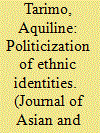

|
|
|
|
|
| Publication |
2010.
|
| Summary/Abstract |
Kenya is encountering many challenges. One of them includes the tendency of manipulating ethnic identities for private interest. We can grasp the root causes of the prevailing ethno-political violence insofar as we take seriously the following questions. How is ethnic identity related to the conflict of loyalties and interests? How have the dynamics of ethnic identities fashioned the existing understanding of the common good and political life? Have Christian churches managed to stand above ethnocentrism and the tension it generates? In search for long-term solutions to these questions this study shows how ill-founded methodologies tend to sideline equal citizenship among citizens in favor of the model of exclusion founded upon ethnocentrism. The challenge of integrating cultural identities in the processes of political integration and democratization is closely related to the problematic concepts of nation-state, citizenship, and common good.
|
|
|
|
|
|
|
|
|
|
|
|
|
|
|
|
|
|
|
|
|